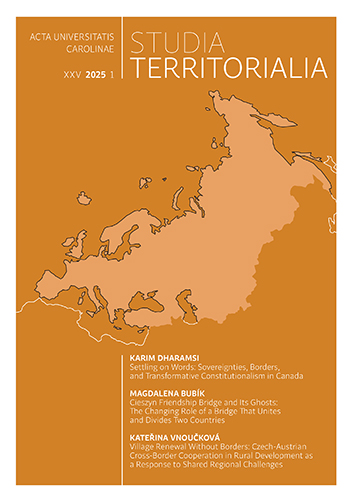AUC Studia Territorialia (Acta Universitatis Carolinae Studia Territorialia) is a peer-reviewed academic journal focusing on Area Studies. It covers political, economic, social, and cultural affairs of North America, Europe, and post-Soviet Eurasia in the twentieth and twenty-first centuries. The journal was founded in 2001; currently, it appears biannually, both electronically and in print. It publishes original scholarly articles, book reviews, conference reports and research notes. The journal is a publication of the Institute of International Studies at Charles University’s Faculty of Social Sciences.
AUC STUDIA TERRITORIALIA, Vol 19 No 1 (2019), 13–41
Intersecting Asymmetries: The Internationalization of Turkey in the 1920s and the Limits of the Postcolonial Approach
Carolin Liebisch-Gümüş
DOI: https://doi.org/10.14712/23363231.2019.15
published online: 25. 11. 2019
abstract
Previous studies of Turkey’s relations with the League of Nations suggest that in the 1920s, the relationship was marked by Turkey’s exclusion from the League and disputes over territories and sovereignty. Only at the end of the decade did Turkey begin to join the international community, culminating in its becoming a member of the League in 1932. This article proposes a fresh reading of Turkey’s internationalization (i.e., its participation in international organizations) in the 1920s. Not only do we begin to see Turkish membership in a considerable number of smaller international organizations, but the government also developed ties with the League Secretariat and the International Labour Office, even though it formally remained a non-member of the League. These more subtle forms of cooperation, this article argues, were part of a balanced strategy of internationalization that reflected the (semi)colonial underpinnings of many international organizations and the Ottoman experience with them. This internationalization strategy was grounded in the Kemalists’ ideological conceptualization of the global order as profoundly shaped by European hegemony. In so arguing, this article adopts a postcolonial perspective. However, it also points out the limits of such a perspective, stressing that power asymmetries on the international level were connected with internal asymmetries within Turkey itself.
keywords: Turkey; international organizations; League of Nations; International Labour Organization; nation building; post-colonialism
Published by the Karolinum Press. For permission to use please write to journals@karolinum.cz.
148 x 210 mm
periodicity: 2 x per year
print price: 180 czk
ISSN: 1213-4449
E-ISSN: 2336-3231
